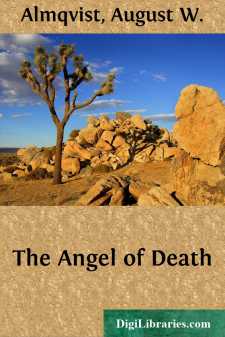Categories
- Antiques & Collectibles 13
- Architecture 36
- Art 48
- Bibles 22
- Biography & Autobiography 813
- Body, Mind & Spirit 142
- Business & Economics 28
- Children's Books 14
- Children's Fiction 11
- Computers 4
- Cooking 94
- Crafts & Hobbies 4
- Drama 346
- Education 46
- Family & Relationships 57
- Fiction 11829
- Games 19
- Gardening 17
- Health & Fitness 34
- History 1377
- House & Home 1
- Humor 147
- Juvenile Fiction 1873
- Juvenile Nonfiction 202
- Language Arts & Disciplines 88
- Law 16
- Literary Collections 686
- Literary Criticism 179
- Mathematics 13
- Medical 41
- Music 40
- Nature 179
- Non-Classifiable 1768
- Performing Arts 7
- Periodicals 1453
- Philosophy 64
- Photography 2
- Poetry 896
- Political Science 203
- Psychology 42
- Reference 154
- Religion 513
- Science 126
- Self-Help 84
- Social Science 81
- Sports & Recreation 34
- Study Aids 3
- Technology & Engineering 59
- Transportation 23
- Travel 463
- True Crime 29
The Angel of Death
Description:
Excerpt
PREFACE.
The original, of which this is a translation, is universally considered one of the very best among many beautiful poems written by the same illustrious author. The sublime didactic thoughts therein expressed, in language majestic and yet so simple, have won for it a constantly increasing popularity; and, during half a century, in a language so rich in literary beauties as the Swedish, have maintained it among the foremost of poetical productions of its kind.
A correct English translation, therefore, is fraught with difficulties which but few persons can appreciate. It has been my aim to reproduce the poem in the original meter, with the rhymes in their proper places. Of course, care has been taken to preserve the sense, and even the idioms of the original. How far I have been successful it is hardly for me to say. As it is, I give it to the reading public.
The poem has undoubted merits in the original. If the merits are concealed in the translation, the fault is mine.
A. W. ALMQVIST.
Gathered from the files in the Royal Academy of Sciences, Stockholm, Sweden.
Johan Olof Wallin, (pronounced Valleen), the author of the "The Angel of Death," was a native of Sweden, and was born in the parish of Stora Tuna, in the province of Dalarne (Dalecarlia), October 15, 1779. His father was a military man, and some time after Johan's birth became captain of the Dalecarlia regiment. The future poet and preacher was one of a large family, much larger than accorded well with the somewhat restricted means of the captain of a regiment.
At a very early age, young Johan evinced a taste for books, and for study generally; but the circumstances of his family were not such as to encourage the hope of an academic career. As has often happened in such circumstances, the talents of the boy commanded attention; and he was not left without a good primary education. At the early age of thirteen he began to help himself; and, by taking part in the education of others, he contrived to prolong his own studies, and acquired great proficiency in the classics, especially in Latin. When only seventeen years of age, he made his first public appearance at the Gymnasium of Westerås, and by the delivery of a poetical speech in Latin—a speech which is still preserved and which is remarkable for its literary merits—he astonished all his seniors. Henceforth Johan Olof Wallin was a marked man among his contemporaries.
It was not long after this triumph at the Gymnasium, that young Wallin felt discouraged for the want of funds. It was now desirable that he should give himself to the higher department of study under competent teachers; but money was needed, and he knew not where to find it. In his difficulty he felt strongly tempted to give up his studies, and to give himself to his father's profession. His delicate health, however, stood in the way; and, happily, a serviceable situation as teacher having offered itself, he was saved to literature. In the fall of 1799, after a most creditable examination, he was entered as student at the Upsala Academy....


